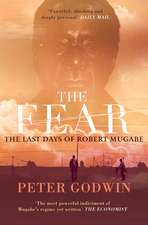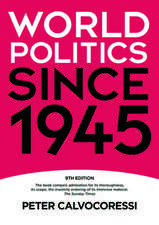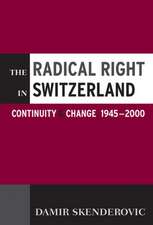Why Did the Soviet Union Collapse?: Understanding Historical Change: Understanding Historical Change
Autor Robert Strayeren Limba Engleză Paperback – 30 apr 1998
| Toate formatele și edițiile | Preț | Express |
|---|---|---|
| Paperback (1) | 467.91 lei 6-8 săpt. | |
| Taylor & Francis – 30 apr 1998 | 467.91 lei 6-8 săpt. | |
| Hardback (1) | 1209.11 lei 6-8 săpt. | |
| Taylor & Francis – 30 apr 1998 | 1209.11 lei 6-8 săpt. |
Preț: 467.91 lei
Nou
Puncte Express: 702
Preț estimativ în valută:
89.61€ • 92.33$ • 75.07£
89.61€ • 92.33$ • 75.07£
Carte tipărită la comandă
Livrare economică 22 februarie-08 martie
Preluare comenzi: 021 569.72.76
Specificații
ISBN-13: 9780765600042
ISBN-10: 0765600048
Pagini: 240
Ilustrații: illustrations, bibliography, index
Dimensiuni: 152 x 229 x 16 mm
Greutate: 0.82 kg
Ediția:New.
Editura: Taylor & Francis
Colecția Routledge
Locul publicării:Oxford, United Kingdom
ISBN-10: 0765600048
Pagini: 240
Ilustrații: illustrations, bibliography, index
Dimensiuni: 152 x 229 x 16 mm
Greutate: 0.82 kg
Ediția:New.
Editura: Taylor & Francis
Colecția Routledge
Locul publicării:Oxford, United Kingdom
Cuprins
Introduction: Contexts and Comparisons; Chapter 1 Legacies: The Burdens of Russian and Soviet History; Chapter 2 Cracks in the Foundation: The Post-Stalin Years; Chapter 3 Reviving Soviet Socialism: The Gorbachev Experiment; Chapter 4 Unintended Consequences: Economic Crisis and Social Awakening; Chapter 5 Passing into History: The Final Act of the Soviet Drama;
Descriere
Taking the Soviet collapse as a case study, this text engages students in the exercise of historical analysis, interpretation and explanation. In exploring the question posed by the title the author introduces concepts as power conflict, revolution and transition to democracy in an accessible way.









